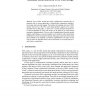22 search results - page 1 / 5 » Randomized Fast Design of Short DNA Words |
ICALP
2005
Springer
13 years 10 months ago
2005
Springer
We consider the problem of efficiently designing sets (codes) of equal-length DNA strings (words) that satisfy certain combinatorial constraints. This problem has numerous motivati...
BMCBI
2006
13 years 5 months ago
2006
Background: The number of k-words shared between two sequences is a simple and effcient alignment-free sequence comparison method. This statistic, D2, has been used for the cluste...
CSB
2003
IEEE
13 years 10 months ago
2003
IEEE
The design of large scale DNA microarrays is a challenging problem. So far, probe selection algorithms must trade the ability to cope with large scale problems for a loss of accur...
AI
2003
Springer
13 years 10 months ago
2003
Springer
Sets of DNA strands that satisfy combinatorial constraints play an important role in various approaches to biomolecular computation, nanostructure design, and molecular tagging. Th...
RECOMB
2001
Springer
14 years 5 months ago
2001
Springer
motif discovery problem abstracts the task of discovering short, conserved sites in genomic DNA. Pevzner and Sze recently described a precise combinatorial formulation of motif di...


